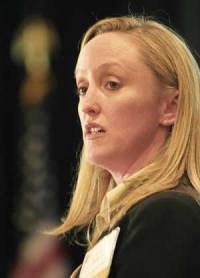The U.S. Catholic bishops wrapped up a busy fall meeting in Baltimore on Nov. 16 to 19, during which:
• The bishops overwhelmingly approved a revision to the directives that guide Catholic health care facilities. New language clarifies that patients with chronic conditions who are not imminently dying should receive food and water by “medically assisted” means if they cannot take them normally. “This obligation extends to patients in chronic and presumably irreversible conditions (e.g., the ‘persistent vegetative state’) who can reasonably be expected to live indefinitely if given such care.”
• The bishops approved with minimal discussion the English translation and U.S. adaptations of five final sections of the Roman Missal. The Vatican’s Congregation for Divine Worship now must grant its recognitio, or approval, to allow the translations to proceed.
• The bishops approved a document criticizing some reproductive technologies to address infertility. “Life-Giving Love in an Age of Technology” rejected the use of donor eggs or sperm as well as surrogate motherhood, artificial insemination, in vitro fertilization and human cloning.
• The bishops heard an interim report from an ongoing study of the causes and contexts of sexual abuse by priests conducted by researchers from New York’s John Jay College of Criminal Justice (pictured right). Researchers told the bishops: “We do not find a connection between homosexual identity and the increased likelihood of subsequent abuse from the data that we have right now.” They reported that the rise in sexual abuse cases in the 1960s and a decrease in the 1980s track with other behavioral changes during the same period.
• Another study reported that religious orders were shrinking in size and their members aging fast. Paul Bednar-czyk, a Holy Cross brother who is executive director of the National Religious Vocations Conference, called the results of the study “Recent Vocations to Religious Life,” conducted by the Center for Applied Research in the Apostolate at Georgetown University, “sobering.” Brother Bednarczyk said the study found the number of men and women in religious life has decreased by 63 percent since the peak in the mid-1960s and that about 75 percent of the men and more than 90 percent of women religious are age 60 or older.








